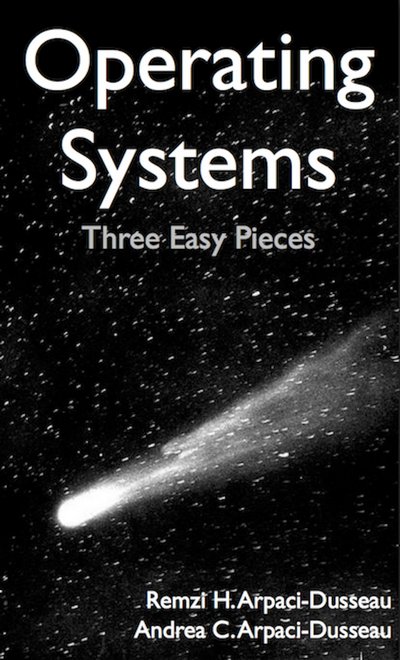
Operating Systems: Three Easy Pieces
This book covers the fundamentals of operating systems, including virtualization of the CPU and memory, threads and concurrency, and file and storage systems.
Tag(s): Operating Systems
Publication date: 09 Aug 2016
ISBN-10: n/a
ISBN-13: n/a
Paperback: 666 pages
Views: 33,319
Operating Systems: Three Easy Pieces
 This book covers the fundamentals of operating systems, including virtualization of the CPU and memory, threads and concurrency, and file and storage systems.
This book covers the fundamentals of operating systems, including virtualization of the CPU and memory, threads and concurrency, and file and storage systems.
Publication date: 09 Aug 2016
ISBN-10: n/a
ISBN-13: n/a
Paperback: 666 pages
Views: 33,319
Document Type: Textbook
Publisher: Self-publishing
License: n/a
Post time: 02 Jun 2017 12:00:00
Arpaci-Dusseau, et al. wrote:The three easy pieces refer to the three major thematic elements the book is organized around: virtualization, concurrency, and persistence. In discussing these concepts, we’ll end up discussing most of the important things an operating system does; hopefully, you’ll also have some fun along the way. Learning new things is fun, right? At least, it should be.
Each major concept is divided into a set of chapters, most of which present a particular problem and then show how to solve it. The chapters are short, and try (as best as possible) to reference the source material where the ideas really came from. One of our goals in writing this book is to make the paths of history as clear as possible, as we think that helps a student understand what is, what was, and what will be more clearly. In this case, seeing how the sausage was made is nearly as important as understanding what the sausage is good for.
Tweet
About The Author(s)
Andrea Arpaci-Dusseau joined the Computer Science Department at the University of Wisconsin-Madison in January 2000 as an Assistant Professor and was promoted to Associate Professor with tenure in 2007. Her research interests are in operating systems and distributed systems, with an emphasis on file and storage systems. Professor Arpaci-Dusseau has both co-won and helped students win a number of records for fast sorting: PennySort in 2002, Datamation in 2001 and 1997, and MinuteSort in 1997. She received her NSF Career award in 2002 for Exploiting Gray-Box Techniques in Systems.

Andrea Arpaci-Dusseau joined the Computer Science Department at the University of Wisconsin-Madison in January 2000 as an Assistant Professor and was promoted to Associate Professor with tenure in 2007. Her research interests are in operating systems and distributed systems, with an emphasis on file and storage systems. Professor Arpaci-Dusseau has both co-won and helped students win a number of records for fast sorting: PennySort in 2002, Datamation in 2001 and 1997, and MinuteSort in 1997. She received her NSF Career award in 2002 for Exploiting Gray-Box Techniques in Systems.
Remzi Arpaci-Dusseau is a full professor in the Department of Computer Sciences at the University of Wisconsin-Madison, where he has taught since the beginning of the millennium. He co-leads a group with his wife, Professor Andrea Arpaci-Dusseau; their work focuses on systems (broadly) but with a special emphasis on file and storage systems. They have graduated 18 Ph.D. students in their time at Wisconsin, and some of their innovations, including block-level storage introspection, transactional checksumming and fast file-system checking, now ship in commercial systems and are used daily by millions of people.

Remzi Arpaci-Dusseau is a full professor in the Department of Computer Sciences at the University of Wisconsin-Madison, where he has taught since the beginning of the millennium. He co-leads a group with his wife, Professor Andrea Arpaci-Dusseau; their work focuses on systems (broadly) but with a special emphasis on file and storage systems. They have graduated 18 Ph.D. students in their time at Wisconsin, and some of their innovations, including block-level storage introspection, transactional checksumming and fast file-system checking, now ship in commercial systems and are used daily by millions of people.